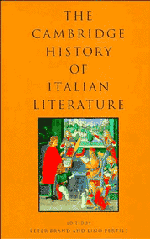Book contents
- Frontmatter
- Origins and Duecento
- The Trecento
- 4 Dante
- 5 Boccaccio
- 6 Petrarch
- 7 Minor writers
- The Quattrocento
- The Cinquecento
- The Seicento: Poetry, Philosophy and Science
- Narrative prose and theatre
- The Settecento
- The Age of Romanticism (1800–1870)
- The Literature of United Italy (1870–1910)
- The Rise and Fall of Fascism (1910–45)
- The Aftermath of the Second World War (1945–56)
- Contemporary Italy (since 1956)
- Bibliography
- References
6 - Petrarch
from The Trecento
Published online by Cambridge University Press: 28 March 2008
- Frontmatter
- Origins and Duecento
- The Trecento
- 4 Dante
- 5 Boccaccio
- 6 Petrarch
- 7 Minor writers
- The Quattrocento
- The Cinquecento
- The Seicento: Poetry, Philosophy and Science
- Narrative prose and theatre
- The Settecento
- The Age of Romanticism (1800–1870)
- The Literature of United Italy (1870–1910)
- The Rise and Fall of Fascism (1910–45)
- The Aftermath of the Second World War (1945–56)
- Contemporary Italy (since 1956)
- Bibliography
- References
Summary
Petrarch, the most committed of the great trecentisti to the revitalisation of a Latin literary culture in Italy, was at the same time the most decisive of them for the development of the vernacular tradition. Dante, it is true, had his followers – not least among them Boccaccio in the Amorosa visione and Petrarch himself in the Trionfi – in respect of a certain kind of visionary literature in the vernacular, and Boccaccio was to remain for generations a point of reference in respect of the novella tradition in Italian. But neither was as decisive for the development of literary good taste in Europe, in and beyond the Renaissance period, as the Petrarch of the Rime. And here there is an irony, for of all the great trecentisti, Petrarch, a poet of well-nigh unerring tact in the management of form, is psychologically the least settled of them, the least at one with himself in respect of the conflicting forces of personality and of moral sensibility. At every point in the Canzoniere (the traditional title of his collected Rime), the technical assurance flowing from his extraordinarily developed sense of formal propriety contrasts with – even as it gives expression to – a sustained sense of spiritual uncertainty, a state of mind characterised at every turn by a sense of restlessness and irresolution.
Life
The formal circumstances of Petrarch's life, with its endless oscillation between the courtly patronage of popes, priests and princes and the stillness of his country retreats, are themselves a metaphor of his spiritual existence. Born in Arezzo in 1304 of a Florentine lawyer exiled (like Dante) from his native city as a White Guelf, his early years were spent in Pisa, in Avignon (where his father came to work in 1312) and at Carpentras in Provence, where he was schooled in grammar and rhetoric by another exiled spirit, Convenevole da Prato. In 1316, in Montpellier, he began his legal studies, which for a time, though with less than complete commitment, he continued in Bologna.
- Type
- Chapter
- Information
- The Cambridge History of Italian Literature , pp. 89 - 107Publisher: Cambridge University PressPrint publication year: 1997

